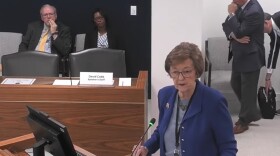The state House’s budget bill would delay scheduled income tax cuts while giving state employees and teachers larger raises than the Senate is proposing.
Gov. Josh Stein has been calling on lawmakers to pause personal and corporate income tax cuts to avoid hitting a fiscal cliff where state revenues decline. The Senate's budget doubles down on the cuts, but the House budget would change the revenue targets that trigger lower taxes. That means the state would have to see bigger revenue growth before the tax rates would drop.
House leaders say that change is needed to address inflation. But they’re proposing other tax changes aimed at reducing costs for lower- and middle-income families, including an increase in the standard deduction, a tax exemption for some tipped wages and a back-to-school sales tax holiday that the state eliminated in 2014.
The House budget also calls for state employees to get a 2.5% raise starting in July, but no raise the following year.
By contrast, the Senate’s budget calls for a 1.25% raise starting in July, along with bonuses totaling $3,000 over two years.
Most teachers would see bigger raises, with starting salaries increasing by $7,000 to $48,000 this year and to $50,000 the following year. The goal is to give North Carolina the highest starting pay in the Southeast.
Early career teachers would get larger raises than veteran teachers; those with 25 years of experience or more would get a 3.3% raise over two years to $57,820 (not including local salary supplements that most school districts provide).
The budget would also cut thousands of vacant positions across state government. A handful of positions that aren’t vacant would be cut as well, primarily in programs that Republicans view as examples of diversity, equity and inclusion (DEI) initiatives. Those include the Office of Health Equity and environmental justice and education programs and total about $10 million in state spending.
"We evaluated every area of the state budget, cutting wasteful spending wherever we found it to fund significant pay raises for our teachers and other state employees with no tax increase," Rep. Dean Arp, R-Union and a leading House budget writer, said in a news release Monday.
The House budget would also eliminate thousands of vacant state government jobs by requiring state agencies to cut 20% of positions that are currently unfilled.
House Speaker Destin Hall says the change would free up money for targeted raises for hard-to-fill jobs, which agency leaders could decide how to use. "Many of the jobs that are being cut have been unfilled now for a long time, months and maybe even years in some circumstances," he said.
But the State Employees Association of North Carolina says it's the wrong solution for staffing shortages. The group is also concerned that the 2.5% state employee raise proposed by the House is too small.
We have thousands of state job vacancies because the State of NC doesn’t pay enough. So…the NC General Assembly is looking to cut even more jobs in order to give folks a whopping 2.5%. Do they think that will make the rest stay? Make it make sense #ncpol
— Ardis Watkins (@ArdisWatkins) May 19, 2025
The House will vote on the plan later this week before starting negotiations with the Senate on a final budget, which legislative leaders hope to wrap up before the end of June.
House Democratic Leader Robert Reives, D-Chatham, said in a news release that the House plan is an improvement over the Senate's budget.
"The House budget proposal gets us closer to what Governor Stein proposed on teacher pay and addressing our state’s fiscal cliff," Reives said. "Unfortunately, there are cuts to public safety, public services, and negative impacts on clean air and water efforts. Additionally, taxpayer funded private school vouchers continue to divert funds from public schools to send wealthy children to private schools."
Separately, Stein unveiled a Helene recovery budget request on Monday, asking lawmakers to approve an additional $891 million for western North Carolina. The House is planning to advance its own Helene funding bill later this week.
Other highlights of the House’s main budget were released last week. Outside of the spending cuts, the budget would add more childcare subsidies by increasing reimbursement rates, an effort to deal with funding shortfalls at childcare facilities.
It would also open three new DMV offices to reduce wait times, including locations in Fuquay-Varina, Cabarrus County and Brunswick County.
Another notable contrast with the Senate’s budget plan is that while the Senate wants to significantly increase taxes on sports betting operators, the House would keep the current rates unchanged.







